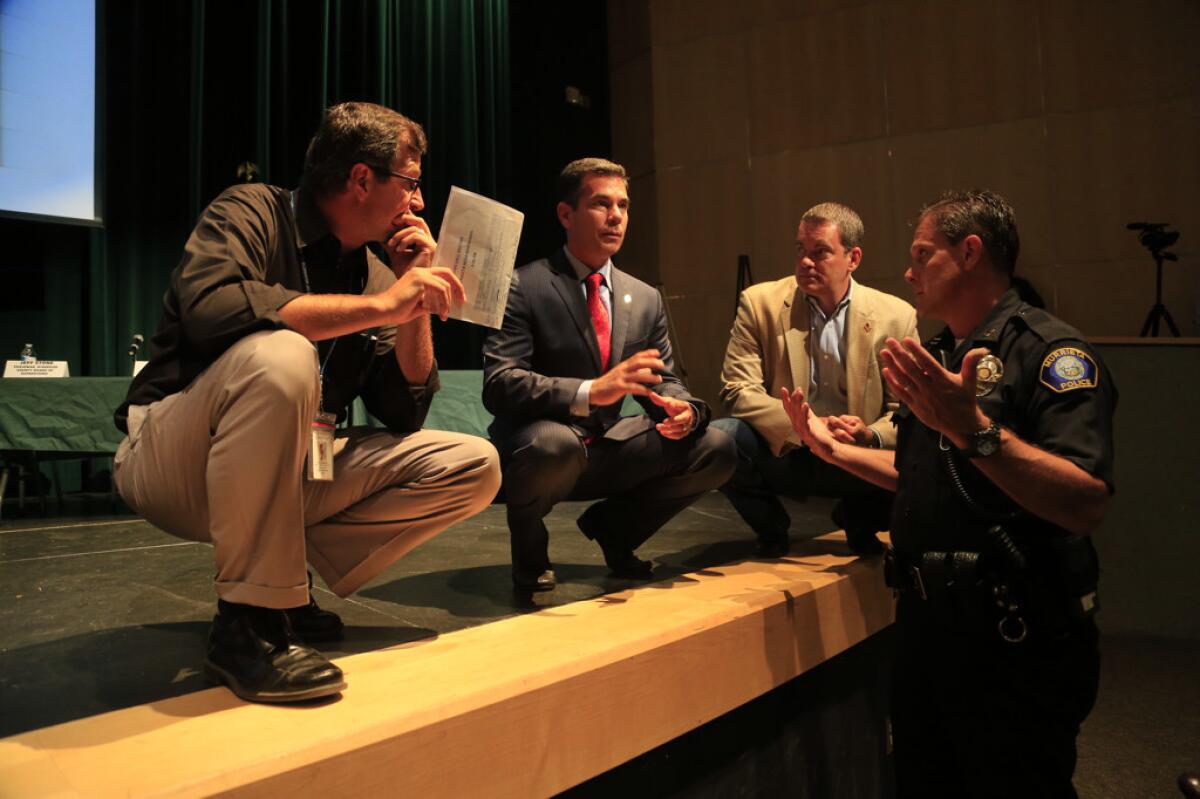Murrieta’s budget and image take a hit from immigration protests

- Share via
Reporting from Murrieta, Calif. — When it all blows over, Murrieta Mayor Alan Long says he might send the White House a bill.
Since July 1, when protesters turned away three buses of immigrant women and children scheduled to be processed in a local Border Patrol facility, Murrieta has become a focus of the debate over what to do with the thousands of detainees who have come across the border illegally since October, mostly from Central America.
City employees have worked long hours keeping residents informed, controlling protesters lined up in front of the station and fielding media inquiries.
That is taking an economic toll, said Long. City officials estimate they’ve doled out $50,000 in overtime pay.
“It’s a concern of ours from the very beginning,” Long said. “All of the resources and costs associated. … I joked about sending a bill [to the White House]. I think I will send it just to send it but I don’t anticipate being paid.”
To deal with crowds protesting at the entrance to the Border Patrol facility last week, the city’s police department increased its active patrol to 25 officers from the usual eight, at a time of the year when many officers typically go on vacation.
Several officers worked 18-hour shifts, six more hours than their usual workdays, police chief Sean Hadden said. And more officers have been assigned to mitigate the tensions at protest sites and city meetings throughout the week, Long said.
The city also has had to call for additional help from neighboring law enforcement agencies and the Border Patrol to quell the protests.
“It’s either going to cost you in money or efficiency of your organization because you’ve got to shift resources to something other than what you’re normally doing,” Long said.
But the battle over immigration has also cost the city in another way. Over the past 10 days, the quiet, residential city of 106,000 in southwest Riverside County has been in the news, and the picture has been less than flattering.
Footage of protesters blocking three buses aired nationally, and photos of heated protesters on either side of the issue yelling across a police-created line of separation have appeared on news sites and in newspapers.
One incident was a low point for Long.
As singer Lupillo Rivera, who lives in Temecula, joined the pro-immigrant protesters on Tuesday, he was spat on by an opposing protester.
“That’s not acceptable,” Long told people at a town hall last week. “That will not be tolerated. It’s an embarrassment and not a reflection of the compassionate people we are.”
Long said the behavior displayed by rowdy protesters, who he contends are not from Murrieta, is a reflection of frustration with the federal government.
“I believe that people are at a boiling point and are fed up with inefficiency at a federal level,” he said. “On top of that you put a very controversial national problem on the doorsteps of a small community, I think that was enough to boil over and that created a snowball effect.”
Father Cameron Lemons of St. Paul’s City Church, which is around the corner from the Border Patrol facility, said the events of the last week have left a “black eye” on the city.
“The press that we’ve been getting on the issue has been an embarrassment for most of us in Murrieta,” Lemons said. “That was not an accurate representation of our community and where our area is headed.”
Lemons has lived in the area for 25 years. In that time, he’s seen a population boom, including a considerable growth of Latinos, who now make up 26% of Murrieta’s population.
That growth, Lemons says, has developed into a community at conflict with itself.
“We have a group of people that is the conservative enclave of California,” Lemons said. “But we also have a high percentage of Latinos in our community. We have a city that’s diversifying and becoming more urban. … To paint our city as an extreme conservative town is not representative of our community as a whole.”
Since the blocking of the buses last week, the arrivals of immigrants that had been scheduled for every 72 hours throughout the month of July have been rerouted to San Ysidro. But city officials have been told to continue operating under that assumption.
Follow @james_barragan on Twitter.
More to Read
Sign up for Essential California
The most important California stories and recommendations in your inbox every morning.
You may occasionally receive promotional content from the Los Angeles Times.














